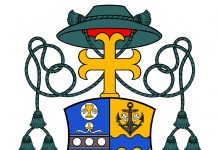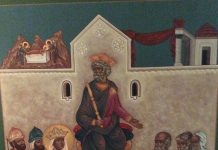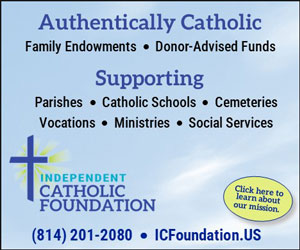Column by Justin Kirkland
As the Easter season approaches and the 40 day penance of stifling our Hallelujahs at Mass ends, the language of “Spreading the Good News of Christ” is sure to accompany any meditation you may read, or Father’s upcoming homily. But what really is this so called “Good News?” Sure Jesus died, He rose from the dead, and made Thomas put his hand in His side, which if you think about it, would have been crazy to experience, but does it really pertain to us almost 2000 years after the fact?
Many people today, even some of us in the Church, believe Jesus is more like a guru, a teacher, or some guy who tells us to be nice to one another instead of God. For a good part of my life, that was my Jesus. He was a guy who told me to do good things while his white bearded dad wrote all my sins in a book to be used against me when I die. Not really my idea of “Good News,” which made me reconsider not just Catholicism, but Christianity as a whole. Why believe this guy when I can just believe another guy like Confucius or Buddha? They both have a pretty good code to live by, right?
But as we dig deeper into the Christian tradition, Jesus is not this white-washed, Eurocentric, feel good, cumbia type, and His dad isn’t meticulously making sure we follow some rule book for no apparent reason. The Good News of Jesus is of course His life, death, resurrection, and ascension. But why? Love.
The love I’m talking about is a mercy and forgiveness of my darkest moments, love which lifts me higher towards virtue whether I’m happy about it or not, a love which promises salvation and eternal life! We look at John 3, the Father sends his only begotten Son not to show us how to be morally upright and tell us to do nice things, but for us to have eternal life. Since we are unable to do it alone, He comes to save us, extending His hand down to pull us up to new heights within Himself. As an unfailing aid, He gives us Scripture and the Sacraments. Through Baptism, we are born again, as a new creation. In receiving the Holy Eucharist we intimately receive the Body, Blood, Soul, and Divinity of Christ which, by our cooperation, transforms and transfigures us from the inside to the outside. Jesus is both our model and the one who gives us such aid, so that we can cooperate with the Holy Spirit (Romans 8) who transforms us through grace which only God can provide. This theosis, or being made into other Christs, is what separates us from the rest, but the implications are enormous. We must act as He acts. This is why we use crucifixes to remind us of how we are able to obtain this divinization. As Christ tells us in Matthew 16: 24-26, we must take up our cross and follow Him, sacrificing all that we are for others even to the point of a humiliating death.
In fighting this fight and finishing the race, a crown awaits us in heaven (2 Timothy 4-8). This, our ultimate goal, is what we call Sainthood. The Good News of Christ is that He came down not just that He may share in our humanity, but that we may share in His divinity. We may somehow become like Him. That we may encounter Him more fully, taking us as we are, sinful and fragile, but not leaving us there. This Jesus, is nothing like the one I knew before. This God tenderly cares for my deepest wounds, picks me up, and continues to give me Himself everyday though I have done nothing to deserve it, knowing that I may freely reject Him. This Jesus has lifted up the Saints of every age, and continues today to raise us closer to Himself for no other reason but absurd and unfathomable love.
“Every Christian is to become a little Christ. The whole purpose of becoming a Christian is simply nothing else.” – C.S Lewis, Mere Christianity
Justin Kirkland is a graduate of Franciscan University of Steubenville, OH, with a degree in Theology. He works in the Diocese of Altoona-Johnstown Office of Communications/Evangelization.






























